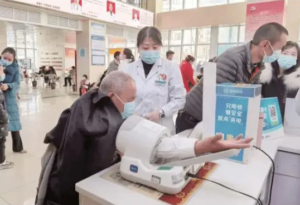
Carrying out a survey of serum antibody levels in the population, experts: understanding the protective properties between antibodies to different strains
“Serum antibodies are the corresponding specific antibodies produced by the body’s immune system after the body has been infected by a pathogen that stimulates the body’s immune system, and the specific antibodies specifically target a pathogen with recognition and killing effects.” Li Jun, director of the Department of Infectious Diseases at Jiangsu Provincial People’s Hospital, told People’s Daily Health Client that the examination of serum antibody levels for new coronavirus usually provides insight into the number of people who have been infected, and the stratified analysis of serum antibodies can provide insight into the differences in antibody production or antibody levels between vaccinated and unvaccinated people who are reinfected, the protective properties of antibodies against different strains of new coronavirus, etc.
In an exclusive interview with Xinjing News on January 31, Wang Quan Yi, deputy director of the Beijing CDC, said that Beijing will conduct a survey of serum antibody levels in the population to comprehensively assess the situation of new coronavirus infection.
It is reported that the survey is planned to be completed from February to March this year, and a multi-stage stratified random sampling method will be adopted to select about 5,000 community people from 16 jurisdictions and the Economic Development Zone for questionnaire survey and serological specimen collection. The content of the questionnaire included information on basic information of the survey population, nucleic acid and antigen testing, morbidity consultation referral, and vaccination status. The study will provide a reference for optimal resource allocation and prevention and control of new crowns.
“There are usually five types of immunoglobulins, IgG, IgM, IgA, IgE, and IgD, and the types of antibodies to neo-coronavirus that are currently commonly tested on the population are IgG and IgM,” Li Jun introduced.
Wang Bo, director of the Department of Infection at Fengtai Chinese and Western Medicine in Beijing, analyzed to the reporter that Beijing will carry out a survey of population serum antibody levels in three ways: first, it is used to assess the number of people infected and the prevalence of this wave of the epidemic in the city; second, it is a dynamic assessment of neutralizing antibody levels and how to carry out epidemic prevention and control in China in the next step; third, it is a dynamic assessment of antibody levels and the development of the next vaccination plan.
According to the sampling and monitoring data of influenza-like cases in Beijing, in the fourth week of 2023 (January 23-29), the number of influenza-like cases among the cumulative number of outpatient and emergency clinic visits monitored in Beijing’s medical institutions above the second level decreased by 40.87% compared with the previous week, 84.53% compared with the same period last year, and 93.74% compared with the peak of the current epidemic season; Beijing collected and tested a total of 453 respiratory specimens, of which 23 were positive for nucleic acid of the new coronavirus, a positive rate of 5.08% (compared to 11.59% the week before).
“The current population has established temporary immune protection, after infection with the new crown, the body will produce the corresponding neutralizing antibodies, there is now a certain cross-immunity to the new crown variant strain XBB, etc., but no matter what level their own antibodies are at, it is still necessary to do a good job of basic protection, such as reducing the gathering of people, wear a mask when you go out, wash your hands regularly, and ventilate your home often. ” Wang Bo suggested.


Average Rating